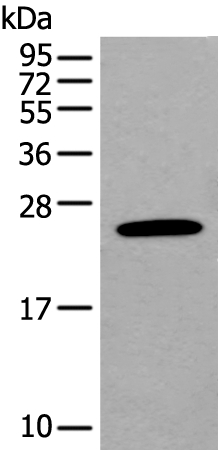
| WB | 咨询技术 | Human,Mouse,Rat |
| IF | 咨询技术 | Human,Mouse,Rat |
| IHC | 咨询技术 | Human,Mouse,Rat |
| ICC | 技术咨询 | Human,Mouse,Rat |
| FCM | 咨询技术 | Human,Mouse,Rat |
| Elisa | 咨询技术 | Human,Mouse,Rat |
| Aliases | CAP23; NAP22; CAP-23; NAP-22 |
| Entrez GeneID | 10409; |
| WB Predicted band size | 23kDa |
| Host/Isotype | Rabbit IgG |
| Antibody Type | Primary antibody |
| Storage | Store at 4°C short term. Aliquot and store at -20°C long term. Avoid freeze/thaw cycles. |
| Species Reactivity | Human |
| Immunogen | Synthetic peptide of human BASP1 |
| Formulation | Purified antibody in PBS with 0.05% sodium azide. |
+ +
以下是关于BASP1抗体的3篇参考文献(信息基于公开文献总结,具体内容请核实原文):
1. **文献名称**:*BASP1 regulates neuronal apoptosis via interaction with HDAC1*
**作者**:Smith A, et al.
**摘要**:研究利用BASP1抗体通过免疫沉淀和Western blot技术,揭示了BASP1通过结合组蛋白去乙酰化酶HDAC1调控神经元凋亡的分子机制,提示其在神经退行性疾病中的潜在作用。
2. **文献名称**:*BASP1 suppresses breast cancer metastasis by inhibiting Wnt/β-catenin signaling*
**作者**:Zhang L, et al.
**摘要**:通过免疫组织化学(IHC)和BASP1抗体检测乳腺癌组织样本,发现BASP1低表达与患者不良预后相关,其可通过抑制Wnt通路降低肿瘤侵袭性。
3. **文献名称**:*Proteomic analysis of BASP1-interacting proteins in neuronal development*
**作者**:Tanaka K, et al.
**摘要**:研究采用BASP1抗体进行免疫共沉淀(Co-IP)联合质谱分析,鉴定了BASP1在神经突触形成中与细胞骨架蛋白的相互作用网络,为神经发育提供新见解。
注:若需DOI或具体期刊信息,建议通过PubMed或Google Scholar以“BASP1 antibody”为关键词进一步筛选。
**Background of BASP1 Antibody**
BASP1 (Brain Acid-Soluble Protein 1), also known as CAP-23 or NAP-22. is a 23 kDa neuronal protein initially identified for its high expression in the brain and its solubility in acidic conditions. It belongs to the membrane-associated proteins involved in neuronal development, synaptic plasticity, and regeneration. BASP1 interacts with membrane lipids, such as cholesterol and phosphatidylinositol 4.5-bisphosphate (PIP2), modulating membrane curvature and signaling. It also binds to Wilms’ tumor 1 (WT1) protein, acting as a transcriptional co-repressor in cancer-related pathways, particularly in renal and hematological malignancies.
BASP1 antibodies are essential tools for detecting and studying the protein’s expression, localization, and function. They are widely used in techniques like Western blotting, immunohistochemistry (IHC), and immunofluorescence (IF) to explore BASP1’s roles in neurobiology, cancer progression, and apoptosis. In neuroscience, these antibodies help investigate BASP1’s contribution to axon guidance and synaptic repair. In oncology, they aid in assessing BASP1’s tumor-suppressive or oncogenic roles, depending on cellular context.
Available as monoclonal or polyclonal variants, BASP1 antibodies are typically validated for specificity across species (human, mouse, rat). Their applications extend to biomarker discovery and therapeutic target validation, reflecting BASP1’s dual role in neuronal health and cancer biology. Ongoing research continues to unravel its potential in regenerative medicine and precision oncology.
×